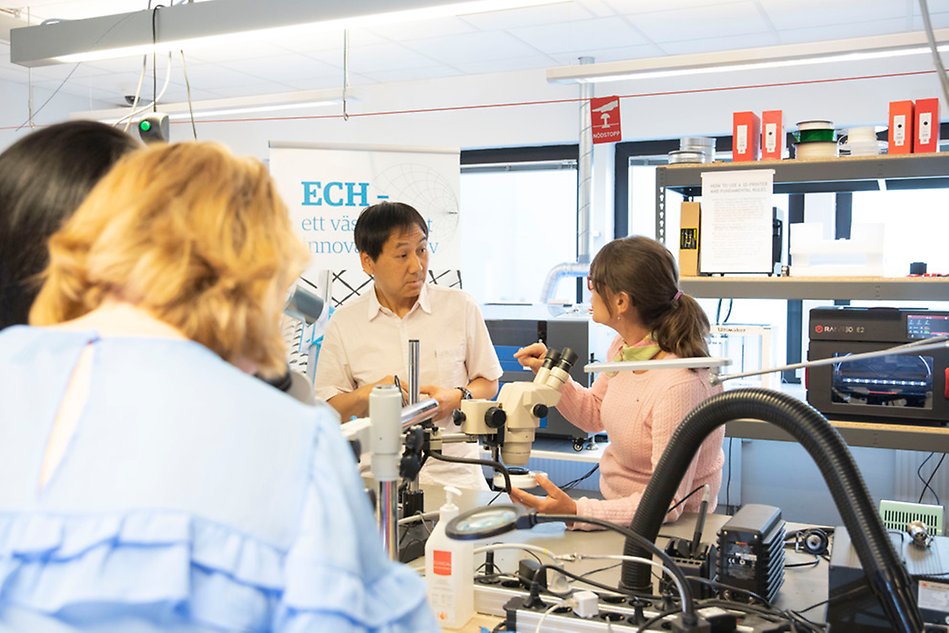About The School of Information Technology (ITE)
The School of Information Technology (ITE) is a multicultural school with around 155 employees from 20 different countries. ITE is organised into two departments.
The management, administration as well as teachers and researchers have offices in the E and F buildings in the campus area. The students’ lab rooms, project rooms and lecture halls are in buildings A, D and F, but sometimes lectures may also be held in other buildings on campus, as well as in the form of web-based distance teaching. Leap for Life has its premises in the glass corridor in the A Building and The Electronics Centre in Halmstad is in the Z Building.
We prepare future innovators!

Departments
The School of Information Technology (ITE) is organised into two departments that conduct research and education as well as innovation and collaborative activities within their respective subjects.
The department of Computing and Electronics for Real-Time and Embedded Systems (CERES)
CERES conducts research and education within two research areas, Smart Electronic Systems and System of Cyber Physical Systems.
The department of Intelligent Systems and Digital Design (ISDD)
ISDD conducts research and education within two research areas, Digital Service Innovation and Aware Intelligent Systems.
Organisation
Management and administration
- Dean of School: Cristofer Englund
- Vice Dean with responsibility for education: Jörgen Carlsson
- Vice Dean with responsibility for research: Slawomir Nowaczyk
- Head of the department of Computing and Electronics for Real-Time and Embedded Systems (CERES): Ross Friel
- Deputy head of the department of Computing and Electronics for Real-Time and Embedded Systems (CERES): Urban Bilstrup
- Deputy head of the department of Computing and Electronics for Real-Time and Embedded Systems (CERES): Marlena Nowaczyk
- Head of the department of Intelligent Systems and Digital Design (ISDD): Stefan Byttner
- Deputy head of the department of Intelligent Systems and Digital Design (ISDD): Susanne Lindberg
- Deputy head of the department of Intelligent Systems and Digital Design (ISDD): Jens Lundström
- Research Coordinator: Jonathan Burgos
- Research Coordinator: Marisa da Silva
- Controller: Jessika Rosenberg
- Analyst: Jessika Andersson
- Outreach Coordinator: Stella Erlandsson
- Project Economist: Stefan Gunnarsson
- Project Economist: August Theorin
- Human Resources Specialist: Annelie Weiberg
- School Administrator: Camilla Soto
Programme Directors
- Technical Foundation Year and Introduction Semester, 40 and 20 weeks respectively: Mikael Hindgren
The department for Computing and Electronics for Real-Time and Embedded Systems (CERES)
- Computer Science and Engineering, 300 credits: Mikael Hindgren
- Computer Engineer, 180 credits: Nicolina Månsson
- Cyber Security Analyst, 60 credits: Muhammad Ahsan Rasool
- Electrical Engineer, 180 credits: Nicolina Månsson
- Intelligent Systems, 300 credits: Mikael Hindgren
- IT Forensics and Information Security, 180 credits: Mattias Wecksten
- Master's Programme (60 credits) in Electronics Design, 60 credits: Ying Fu
- Master's Programme (60 credits) in Network Forensics, 60 credits: Olga Torstensson
- Mechatronic Engineer, 180 credits: Nicolina Månsson
The department for Intelligent Systems and Digital Design (ISDD)
- Applied Artificial Intelligence (AI), 180 credits: Hadi Fanaee
- Digital Design and Innovation, 180 credits: Susanne Lindberg
- Digital Business Development, 180 credits: Christer Rehnström
- Master’s Programme (120 credits) in Digital Service Innovation, 120 credits: Ahmad Ghazaneh External link.
- Master’s Programme (120 credits) in Embedded and Intelligent Systems, 120 credits: Martin Cooney
- Master's Programme in Experience Design, 120 credits: Dimitrios Gkouskos
- Master’s Programme (120 credits) in Information Technology, 120 credits: Martin Cooney
Advisory board
Chair:
- Cristofer Englund
Representatives of the teaching staff:
- Ove Andersson
- Katerina Cerna
- Struan Gray
- Elena Haller
- Eric Järpe
- Jens Lundström
- Wagner Ourique de Morais (stand-in)
Representatives of the students:
- Tove Nordberg
- Albin Wernebäck
- Joel Nyholm (Ph.D. student)
For questions regarding documents and meeting minutes, contact the secretary of the advisory board: Jessika Andersson

